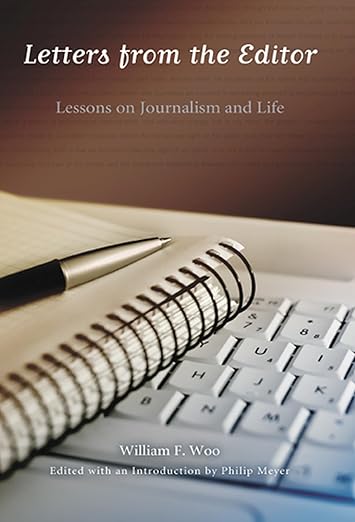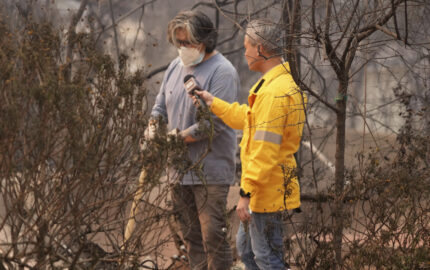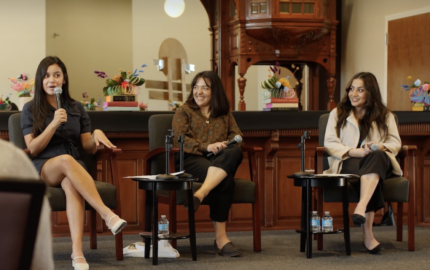
William Woo earned his place in the chronicles of U.S. journalism when he became the first Asian-American to run a major U.S. newspaper. That would be the St. Louis Post Dispatch in 1986. But such distinctions are the stuff of book jacket blurbs and obits. They leave out what made someone a great journalist—what made him human. For Woo, the stuff of journalism and humanity could never be pulled apart.

William F. Woo, edited by Philip Meyer
University of Missouri Press. 216 Pages. $19.95.
During his 10 years as Post-Dispatch editor, he wrote a regular column, and when he retired and went on to Stanford University to teach, the habit never left him. Each week, his students opened their e-mail to find a column of sorts from their professor, who as it turned out hadn’t stopped thinking about them or their craft just because the closing classroom bell had rung. They found that Woo had been mulling and fretting over all things journalism while barbecuing that night’s lamb chops, puttering around the house, or having his evening Scotch. Once the pondering ended, he sat down and sent off his thoughts to his students.
Woo died at age 69 from cancer in 2006. His family later went through his computer and came back with a trove of these letters to students. We now can read the best of them. Edited by his friend and Nieman classmate, Philip Meyer, these frank, reflective and often deeply personal missives to his students now make up a collection, “Letters from the Editor: Lessons on Journalism and Life.”
A lot of journalism instructors have typed out their pedagogy for textbooks. What Woo has left us is a map of how a veteran and committed journalist moves through the world. I twice read this collection of 44 essays and came away wondering what essential idea or theme about journalism Woo overlooked. I can’t think of one. One moment, he speaks to the need to write clearly and simply; the next, the thorniest ethical choices we must make and, in others, the hard lessons we face when we put pride above our duty and lose our way.
He does it all in an easy, conversational manner that draws you in—a practiced intimacy that is the ideal of good writing, as if a friend, hand on your shoulder, is telling you a story. He tells his share of his own adventures from his 40-plus years in the business—like how as a young reporter he landed an exclusive interview with Lyndon Johnson—but never does so in a self-congratulatory manner. He had many career highlights he might have preened over, but that wasn’t his way. He is instead far more persuasive when he turns his analysis back on his own career and helps his students see what might be learned through his mistakes.
Beyond his topics at hand, Woo teaches through example. He finds inspiration in all manner of contact with the world—a headline in that day’s paper, Mozart, or a trip to the doctor’s office as his illness steadily overcame him. The letters remind us how journalism is a daily education, and why so many of us stick with it: We’re addicted to discovery and revelation and disclosure, usually involving others. Woo shows us that thrill can be just as powerful when discovering truths about ourselves.
Woo sought to embed each letter with lesson, but in many cases he went further and carefully laid out a moral. In that way, Woo’s letters to his students make clear that a journalism education must not include simply instructions as to the techniques, mechanics and traditions of the craft. As journalists, we make moral and subjective choices all of the time, just like the people we cover. The failure to acknowledge that—and hide behind the opaque sheeting of objectivity—denies what it is that makes journalism authentic.
As he wrote in one of the last letters in the book:
“The conscientious journalist, in short, is not immune from the uncertainties, the conflicting values, the likelihood for error that are part of the daily possibilities of every man and woman. The reason for this is that journalism is not an end in itself but grows out of the larger life we experience as human beings. If the end of journalism were journalism, then it would be a self-contained enterprise, existing outside of society. But the end of journalism is no more doing journalism than, say, the end of surgery is only to cut people apart instead of saving lives.
“The end of journalism, I believe, is to serve people in the most profound way possible…. So you will need intelligence and experience to do this kind of work and also a sense of your own humanity.”
Throughout this wonderful collection, Woo provides a model to emulate—someone connected to this humanity who, in telling his stories, never forgets his audience. Here that audience was his students, a lucky group that, thanks to this book, now includes all of us.
Brent Walth, a 2006 Nieman Fellow, is a senior reporter at The Oregonian and adjunct faculty at the University of Oregon School of Journalism and Communication.


